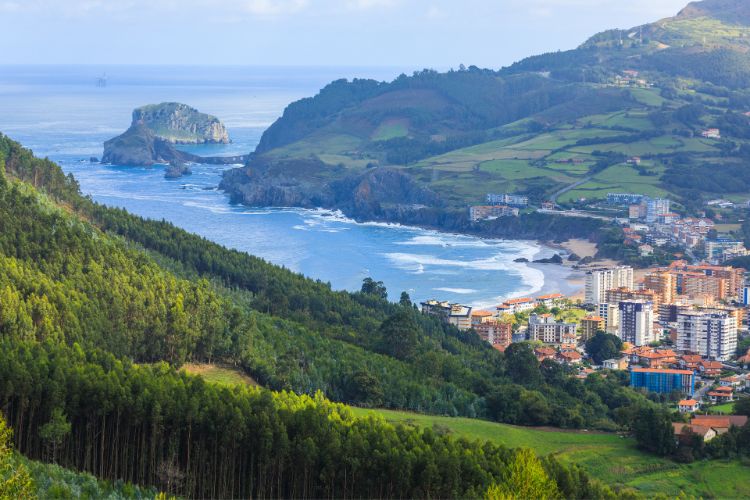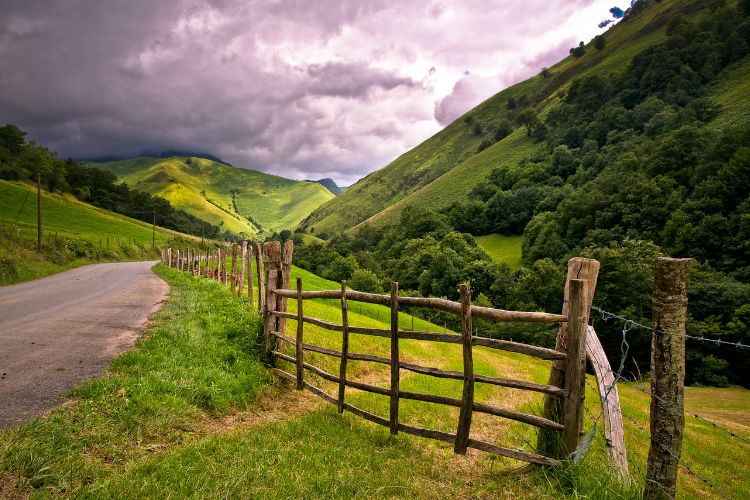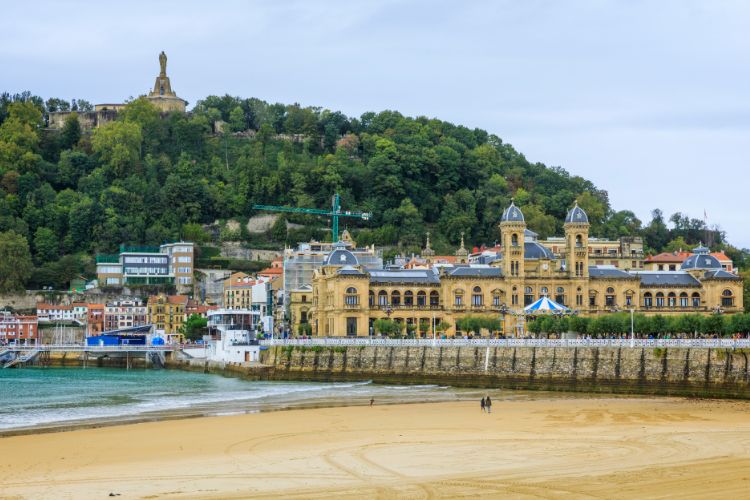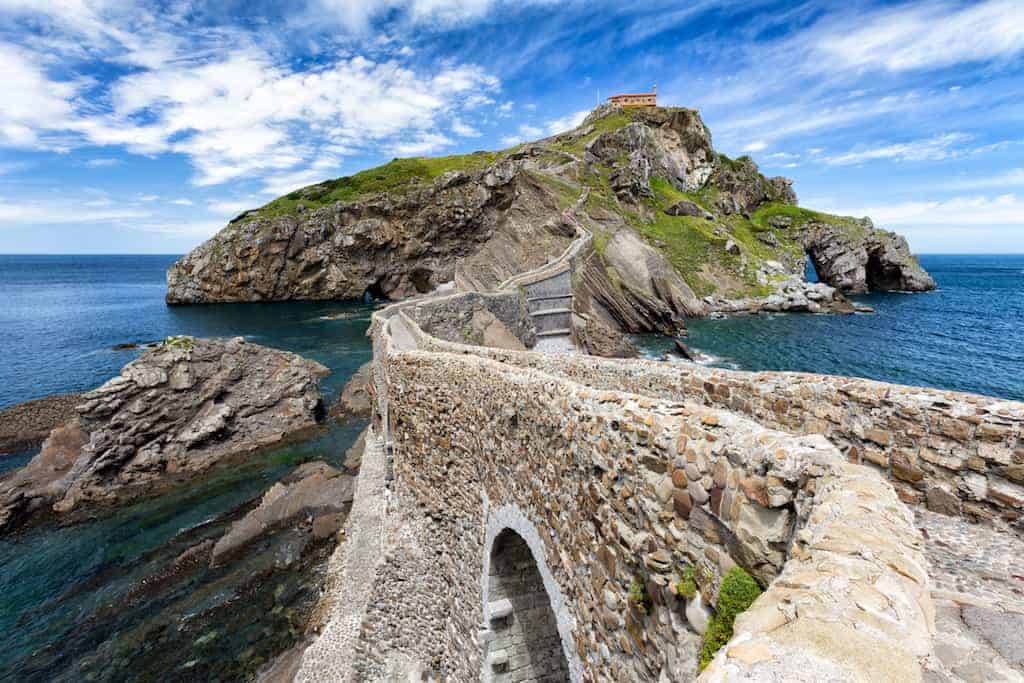Basque Country Offers a Captivating Wine Travel Experience Unlike Any Other
What do wine lovers imagine when thinking of Spain? Is it the rugged hillsides and mountains comprising the backdrop throughout the Rioja region? Or perhaps it’s the easy and sociable pours in tapas bars throughout the country; or a glass of crisp Albariño while sitting seaside in the Rías Baixas region of Galicia. Either way, wine and Spain are nearly inextricable in connotation for most travelers.
The renowned American novelist, Ernest Hemingway frequented the La Rioja region annually for years and famously expressed his thoughts on European wine culture in his autobiographical work, A Moveable Feast,
“Drinking wine was not a snobbism nor a sign of sophistication nor a cult; it was as natural as eating and to me as necessary.”
- Basque Country Offers a Captivating Wine Travel Experience Unlike Any Other
- The Best Things to Do in Basque Country
- How to Get to and Around Basque Country
- Basque Country Basics
- Upscale Hotels in Basque Country
- Wineries to Visit in the Basque Country Wine Region
- Cities and Towns to Visit in the Basque Region
- The Wine of Basque Country… Txakoli (Sha-Ko-Lee)
- The Cuisine of the Basque Region
- Take the Trip to Basque Country
- Frequently Asked Questions about Visiting Basque Country

Background and Highlights of the Basque Country Wine Region
While each of Spain’s wine regions is worth visiting, there’s one that needs a place on every Winetraveler’s list for its absolute uniqueness and character: Basque Country.
Basque Country, or Euskadi as it’s known in the Basque language, is a rugged coastal community isolated by mountain valleys and the Bay of Biscay. Located in northern Spain near the French border, the Basque region is a politically autonomous community with deeply rooted cultural traditions, an ancient language, and distinctive cuisine.
RELATED: An Adventurer’s 3-Week Itinerary For Visiting Spain
The Basque people are thought to be one of Europe’s oldest races with music, dancing, food and wine unlike any other culture. They are lively, imaginative, and passionate about their history, fishing and their autonomy.
Bilbao, famed for its Museo de Guggenheim, is the largest city within Basque Country. It is the center of industry and a significant port city. It’s a living juxtaposition with shipyards, iron ore and steel factories amidst modern architectural masterpieces and a 14th-century medieval district with the city’s lively pintxos bars.
Nearby Gernika-Luma (Guernica) is brimming with history, made famous worldwide by Pablo Picasso’s epic portrayal of the air raid carried out by Nazi Germany at the request of General Franco, Spain’s Nationalist dictator.
Further east along the coast are the cities of Getaria and San Sebastián, the latter among the region’s best-known seaside resort areas teeming with beaches, festivals and a vibrant gastronomic scene. If you’re considering visiting Basque Country from San Sebastián, we highly recommend that you schedule a private, personalized tour with our friend Ernest of Ikusnahi Tours. His enthusiastic personality and local insight will give you an experience you’ll cherish for a lifetime.
Getaria, to the west of San Sebastián, is a quieter beach community frequented more by Spanish vacationers than international tourists and is home to dozens of highly-acclaimed pintxos cafes, as well as the 14th century Iglesia de San Salvador.

The Best Things to Do in Basque Country
Basque Country offers a wide range of activities and attractions for Winetravelers. Whether you’re interested in exploring from a culinary and wine perspective, or you’re looking to blend cuisine with outdoor activities, museums and historical sites. Below, you can purchase tickets for some of the must-see attractions, or schedule tours in advance with our tour operator partners.
Book Tickets & Tours in Advance
Wine Tasting
Visit the Rioja Alavesa sub-region, known for its exceptional wines, and explore renowned wineries such as Marqués de Riscal, Bodega Contador, Bodegas Ysios, and Bodegas Baigorri. Don’t forget to taste the local Txakoli, a crisp white wine, at Bodegas Gorka Izagirre.
Pintxos Crawls
Explore the vibrant culinary scene in cities like Bilbao and San Sebastián by going on a pintxos crawl, hopping from one bar to another to sample different pintxos (Basque tapas) paired with local wines.
Guggenheim Museum (Bilbao)
Visit this iconic contemporary art museum with these skip-the-line tickets, designed by Frank Gehry, showcasing modern and contemporary art exhibits in a stunning architectural setting.
La Concha Beach (San Sebastián)

Relax on this picturesque beach, known for its golden sand and beautiful views, or take a leisurely walk along the promenade.
Casco Viejo (Bilbao)
Wander through the narrow streets of Bilbao’s old town, exploring shops, bars, and historical sites like the Santiago Cathedral and the Mercado de La Ribera.
Santa Maria Cathedral (Vitoria-Gasteiz)
Visit this impressive Gothic cathedral, a key historical site in Vitoria-Gasteiz, featuring beautiful architecture and an ongoing restoration project.
Urdaibai Biosphere Reserve
Discover this UNESCO-designated biosphere reserve near Gernika, home to diverse ecosystems, unique landscapes, and archaeological sites like the Santimamiñe Cave and the prehistoric settlement of El Rincón.
Gaztelugatxe
Hike up to this small island connected to the mainland by a winding stone bridge, topped with the stunning hermitage of San Juan de Gaztelugatxe. The site offers breathtaking views of the coast. Guided tours are frequently offered that primarily leave from Bilbao.
The Flysch Route (Zumaia)
Explore the unique geological formations along the Basque coast, including dramatic cliffs, rock formations, and fossil records, best seen from the towns of Zumaia, Deba, and Mutriku.
Loyola Sanctuary (Azpeitia)
Visit this impressive Baroque-style basilica, part of a larger religious complex dedicated to St. Ignatius of Loyola, the founder of the Jesuits.
Castillo de Butrón (Gatika)
Admire this beautiful neo-Gothic castle, originally dating back to the Middle Ages, nestled in a picturesque forest setting.
How to Get to and Around Basque Country
Basque Country is well-connected by a comprehensive transportation network. The major airports in the area include Bilbao Airport (BIO), the largest in the region, located 9 km north of Bilbao city center, San Sebastián Airport (EAS) situated 22 km east of San Sebastián, and Vitoria Airport (VIT) 8 km away from Vitoria-Gasteiz. These airports serve both domestic and international flights, providing easy access to the Basque Country. Compare and check the latest flight prices from our origination point right here.
Upon arrival, Winetravelers have various transportation options to explore the region. Spain’s national railway company, Renfe, operates trains that connect major Basque cities such as Bilbao, San Sebastián, and Vitoria-Gasteiz.
The high-speed AVE train service is particularly convenient, as it connects Madrid to the Basque Country in just 2-3 hours. Alternatively, bus services like ALSA, PLM Autocares, and La Union Alavesa offer connections between Basque cities and other parts of Spain.
For those wishing to explore the Basque wine country, renting a car is an excellent option. This provides the freedom to travel at your own pace and visit the various vineyards and wineries spread across the region. Major car rental companies have offices at airports and city centers, making it easy for travelers to access this mode of transportation. You can check car rental prices ahead of time here.
Basque Country Basics
Language
The Basque Country is a bilingual region, with both Basque (Euskara) and Spanish being widely spoken. Basque is a unique language with no known relation to any other language family. While most locals speak Spanish, many also take pride in their Basque heritage and language. Learning a few basic phrases in both languages can be helpful and appreciated by locals. However, many people, especially in the hospitality industry, also speak English.
Tipping
Tipping in the Basque Country is not as common as in some other countries, like the United States. In restaurants, rounding up the bill or leaving a small tip (around 5-10%) for good service is appreciated, but not mandatory. In bars, tipping is not common, but you can leave some small change if you wish. For taxi drivers, you can round up the fare or tip around 5-10% for longer rides or exceptional service. Hotel staff, such as porters or housekeepers, may also appreciate a small tip.
Dress
Dress in the Basque Country is generally casual and practical, though people may dress more formally for special occasions or upscale venues. Comfortable clothing and shoes are recommended for exploring cities and towns, while appropriate attire for outdoor activities, like hiking or visiting the beach, is essential. In religious sites, such as churches or cathedrals, modest clothing is expected, with covered shoulders and knees. Keep in mind that the Basque Country’s weather can be unpredictable, so it’s wise to pack layers and rain gear.
Currency
The currency used in the Basque Country is the Euro (€). Credit cards are widely accepted in most establishments, including hotels, wineries, restaurants, and shops. However, it’s a good idea to carry some cash for smaller purchases or in case a business does not accept cards.
Safety
The Basque Country is generally considered a safe region for travelers. Petty crime, such as pickpocketing, can occur in tourist areas, so it’s essential to remain vigilant and keep your belongings secure. In case of an emergency, dial 112 for the European emergency number, which covers police, fire, and ambulance services.
Electrical Outlets
Spain, including the Basque Country, uses the standard European Type C and Type F plugs with a voltage of 230V and a frequency of 50Hz. Travelers from countries with different electrical systems may require a plug adapter or voltage converter. These VINTAR adapters with USB ports are available on Amazon and we take them with us all over Europe.
Upscale Hotels in Basque Country
The Basque Region is quite vast, with a plethora of accommodations scattered throughout many of the major cities, but also within some of the smaller towns. Additionally, some wineries within the region offer lodging that is exceptional. Below, find some of our favorite hotel options in the region.
Hotel Maria Cristina (San Sebastián)
Nestled along the banks of the Urumea River and a short walk from La Concha Beach, Hotel Maria Cristina exudes elegance and sophistication. This Belle Époque-style building, opened in 1912, has played host to numerous celebrities and royalty. The hotel’s lavish rooms and suites feature tasteful décor, plush furnishings, and modern amenities. Indulge in the hotel’s gastronomic offerings at the on-site restaurant, or unwind with a cocktail at the stylish bar. The hotel’s impeccable service and prime location make it an unforgettable base for exploring the beautiful city of San Sebastián.
Check Prices at Hotel Maria Cristina
Gran Hotel Domine Bilbao
Located directly opposite the iconic Guggenheim Museum, Gran Hotel Domine Bilbao offers a perfect blend of contemporary design and luxurious comfort. The hotel’s striking architecture complements the museum’s avant-garde style, and its rooms feature sleek design and sweeping views of the city or the Guggenheim. Enjoy a sumptuous breakfast at the hotel’s atrium, relax with a drink on the rooftop terrace, or savor innovative Basque cuisine at the on-site restaurant. The attentive staff and prime location make this hotel an ideal choice for exploring the vibrant city of Bilbao.
Check Prices at Hotel Domine Bilbao
Viura Hotel (Villabuena de Álava)
Set in the heart of Rioja Alavesa wine country, Viura Hotel offers a unique and unforgettable experience. This boutique hotel’s modern, avant-garde design contrasts beautifully with the traditional architecture of the surrounding village. Each spacious room boasts floor-to-ceiling windows, offering stunning views of the vineyards and mountains. The hotel’s on-site restaurant serves exquisite Basque cuisine, paired with local wines. The rooftop terrace provides a serene setting to enjoy a glass of wine while watching the sun set over the landscape. Viura Hotel is a perfect base for exploring the region’s wineries, charming towns, and breathtaking scenery.
Iturregi Hotel (Getaria)
Tucked away in the lush countryside overlooking the picturesque coastal town of Getaria, Iturregi Hotel offers a tranquil and luxurious retreat. This charming boutique hotel, housed in a converted 19th-century farmhouse, features spacious, elegantly decorated rooms with panoramic views of the Basque coast. Relax by the infinity pool, take a stroll through the hotel’s beautiful gardens, or explore the nearby vineyards producing the region’s famous Txakoli wine. The hotel’s warm and attentive service ensures a truly memorable stay, and its serene location is perfect for those seeking a peaceful escape.
Check Prices at Iturregi Hotel
Hotel Etxegana (Zeanuri)
Found in the stunning Gorbea Natural Park, Hotel Etxegana offers a luxurious and intimate retreat surrounded by nature. This boutique hotel, built in traditional Basque style, features individually decorated rooms with exquisite furnishings, ornate details, and modern comforts. Indulge in the hotel’s spa facilities, including a hot tub, sauna, and a range of rejuvenating treatments. The on-site restaurant serves delectable Basque cuisine crafted from locally sourced ingredients. The hotel’s attentive staff and idyllic setting make it a perfect destination for a romantic getaway or a relaxing escape from the bustle of urban life.
Check Prices at Hotel Etxegana
Wineries to Visit in the Basque Country Wine Region
Marqués de Riscal (Elciego)
C. Torrea Kalea, 1, 01340 Eltziego, Álava, Spain
Marqués de Riscal is a renowned winery in Rioja Alavesa, a sub-region of the Basque Country’s wine region. Known for its iconic, futuristic building designed by architect Frank Gehry, the winery offers stunning views of the vineyards and the picturesque village of Elciego. The winery has been producing quality wines since 1858, and its guided tours provide insight into its history, wine-making process, and a tasting of its exquisite wines.
Bodega Contador (San Vicente de la Sonsierra)
Km. 1, Carretera a, San Vicente de la Sonsierra, 26338, Spain
Bodega Contador is a boutique winery founded by Benjamin Romeo, a celebrated winemaker in the Rioja region. The winery’s limited-production, high-quality wines have gained international acclaim. The modern winery facility, nestled among the vineyards, offers intimate and personalized visits, where visitors can enjoy exclusive tastings of their sought-after wines while soaking in the breathtaking scenery.
Bodegas Ysios (Laguardia)
La Hoya Bidea, s/n, 01300, Araba, Spain
Located in Rioja Alavesa, Bodegas Ysios stands out with its modern, wave-like architecture designed by Santiago Calatrava. Surrounded by the Cantabrian Mountains, the winery’s picturesque setting offers stunning views. Ysios specializes in producing premium wines with a focus on Tempranillo grapes. A guided tour of the winery includes tastings of their exceptional wines and an exploration of the unique architecture.
Bodegas Baigorri (Samaniego)
Vitoria Errepidea, km 53, 01307 Samaniego, Araba, Spain
Bodegas Baigorri is another gem in Rioja Alavesa, with a striking modern building designed by architect Iñaki Aspiazu. The winery utilizes a gravity-fed system for wine production, ensuring minimal intervention and maintaining the highest quality. Surrounded by vineyards and with panoramic views of the Sierra de Cantabria, Winetravelers can enjoy a guided tour, wine tastings, and a delicious meal at the winery’s restaurant.
Bodegas Gorka Izagirre (Larrabetzu)
Legina auzoa s/n, 48195 Larrabetzu, Bizkaia, Spain
Situated near Bilbao, Bodegas Gorka Izagirre specializes in the production of Txakoli, a traditional Basque white wine. The winery combines modern technology with traditional wine-making methods, resulting in high-quality, expressive wines. Set amidst lush green hills, the winery offers guided tours and tastings. Additionally, the on-site restaurant, Eneko Atxa’s Azurmendi, holds three Michelin stars, offering visitors an unparalleled gastronomic experience.
Cities and Towns to Visit in the Basque Region
Bilbao
As the largest city in the Basque Country, Bilbao boasts a mix of modern and traditional architecture. Key attractions include the Guggenheim Museum, a contemporary art museum with a striking titanium-clad design by Frank Gehry, and the Casco Viejo, the city’s old town with narrow streets, bustling squares, and charming shops. Indulge in local pintxos (Basque tapas) at traditional bars and explore the famous La Ribera Market. Don’t miss trying the region’s famous wine, Txakoli.
San Sebastián
Known for its stunning beaches, San Sebastián is a coastal gem with a rich culinary scene. Visit the iconic La Concha Beach, explore the Parte Vieja (Old Town), and sample delicious pintxos paired with local wines at numerous bars. The city is also famous for its Michelin-starred restaurants, offering world-class dining experiences.
RELATED: The Best Things to Do in San Sebastián This Year
Vitoria-Gasteiz
The capital of the Basque Country, Vitoria-Gasteiz is home to well-preserved medieval architecture. Explore the Old Town (Almendra Medieval), visit the 13th-century Santa Maria Cathedral, and discover the Basque Museum of Contemporary Art (Artium). The nearby Rioja Alavesa wine region offers excellent opportunities for wine tasting.
Hondarribia
A picturesque coastal town near the French border, Hondarribia boasts a beautiful old town with colorful Basque-style houses. Key attractions include the Castle of Charles V, the Marina district, and the town’s vibrant food scene. The local fish dishes, pintxos, and Txakoli are must-tries.
Lekeitio
This charming fishing village on the Biscay coast features narrow streets, beautiful beaches, and the impressive Basilica of Santa Maria. Take a stroll along the harbor, visit the nearby Island of San Nicolás at low tide, and enjoy the local cuisine, which includes fresh seafood and traditional Basque dishes. Lekeitio also hosts the unique Antzar Eguna (Goose Day) festival in September, showcasing traditional competitions and activities.
The Wine of Basque Country… Txakoli (Sha-Ko-Lee)
Say what? Txakoli or Txakolina, pronounced sha-ko-lee or sha-ko-lina, is among the long list of reasons to visit the Basque Country. A white wine typically derived from the Hondarribi Zuria grape, is the wine served throughout the region.
Txakoli has three denominaciones de origen (DOs) including Txakoli de Getaria, Txakoli de Bizkaia and Txakoli de Álava.
It’s a light white wine, low in alcohol and high in acidity. Slightly sparkling, the wine is served cold and is the perfect match to Basque cuisines including seafood, local cheese, pintxos, and even rare or cured meats. It’s an intensely dry wine derived from vineyards sitting above sea level along the coast of the region.
Nearly 3.5 million bottles are produced yearly, and most remain in the region with only a small portion available for export – which is not due to a lack of demand outside of the region, but the result of its local popularity. A meal without a bottle, or two, of Txakoli in this region is a rarity – in other words, perfection.
The Cuisine of the Basque Region
Basque cuisine is fresh, vibrant, imaginative and full of seafood. With the Bay of Biscay at its doorstep, the region’s fisherman have long since brought home an abundance of gastronomic treasures including salt cod and the succulent hake; while the farmers of the Erbo Valley have produced an envious bounty of vegetables, beans, cheeses and meats.
READ: 8 Charming Cities in Spain For Food and Wine Lovers
The hallmark of traditional Basque meal preparation lies in its simplicity and cooking “el punto,” or to the point. It is exactly right. Gastronomic Societies, traditionally masculine clubs, throughout the Basque Country are dedicated to preserving this culinary history by making food the center of their social relations. Fortunately, many of these dishes can also be found throughout the region and served at the local pintxos bars.
But while there is something to be said for tradition, the Basques are also renowned for their innovative, modern cooking techniques which emerged in the 1970s. This style blends French technique with Basque preparation, combines flavors, uses new ingredients and showcases creativity. In short, Basque Country is a treat for the senses, and we haven’t even touched on the wine yet!
RELATED: 15 Stunning Vineyard Resorts To Stay at in Spain
Take the Trip to Basque Country
Still not convinced on why a Basque Country tour trek is a worthy goal, consider the words of a man that has drank and dined the world over, and we will soon not forget:
“You’d have a hard time finding anything better than Barcelona for food, as far as being a hub. Given a choice between Barcelona and San Sebastian to die in, I’d probably want to die in San Sebastian.” (Anthony Bourdain, The New York Times, November 2011)
Frequently Asked Questions about Visiting Basque Country
You are reading “Here’s Why and How to Visit Spain’s Basque Country” Back To Top
Basque country wine region Spain, Txakoli Basque region Spain: exceptional local food & travel experiences
If you enjoyed this guide, make sure you register to become a Winetraveler for free! You’ll get access to all of our content and interact with other Winetravelers and for travel inspiration around the world. Be sure to follow along with us on Twitter and Instagram as we continue to feature more exciting destinations.

Great article on a region we first visited 2yrs ago. Totally agree that it is a unique experience (We are headed back in May)!
What a wonderful region. I have been lucky enough to find a few Txakoli wines to try and love them. They are the perfect seaside summer beverage. Thanks for the great view into this region.